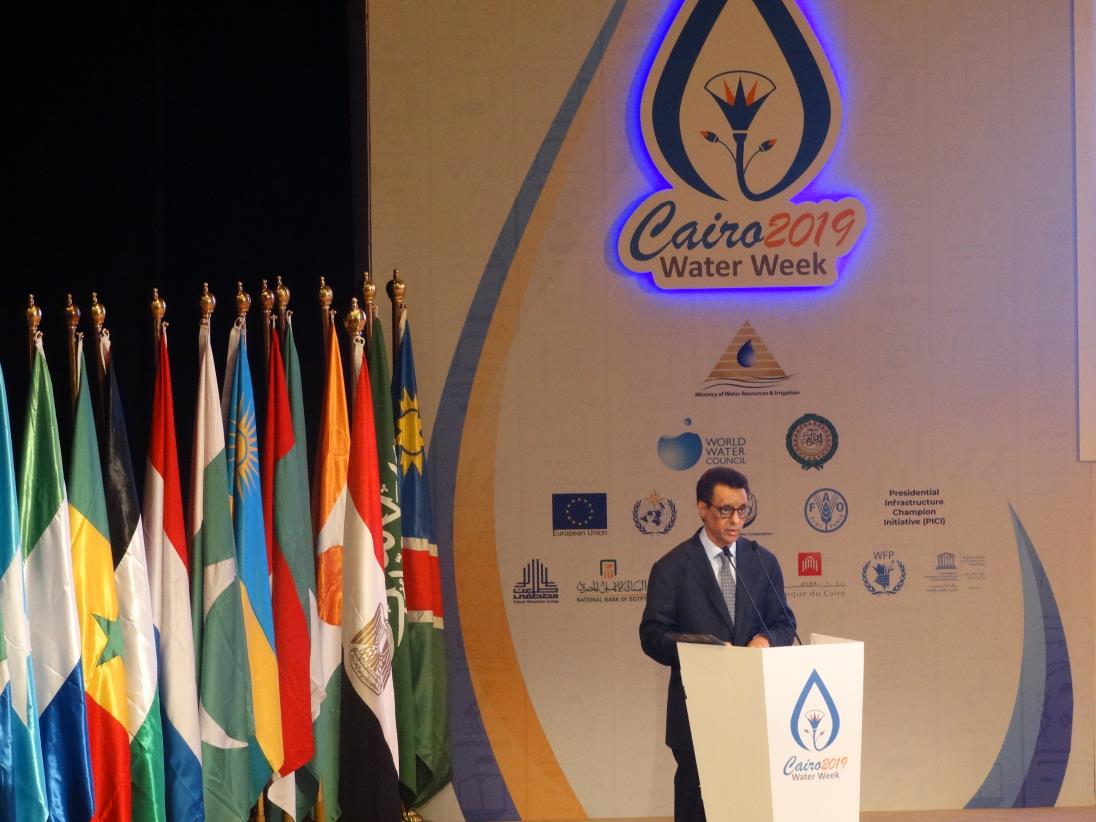FAO calls for a new generation of policies and investments to sustainably address water scarcity in the Arab region

©FAO/Hamada Soliman- FAO Assistant Director-General and Regional Representative addressing the participants of the 2019 Cairo Water Week.
21 October 2019, Cairo - Water scarcity is a formidable challenge facing the Arab region, with sixteen countries in the region already water-stressed. The climate change will only make matters worse in a region that counts on 10 times less water available per capita than the world average.
This was stressed by Abdessalam Ould Ahmed, FAO Assistant Director-General and Regional Representative for the Near East and North Africa, in a speech at the opening of the Cairo Water Week, held under the patronage of His Excellency Egyptian President Abdelfattah El Sissi under the headline "Responding to Water Scarcity".
The opening session was attended by Egyptian Prime Minister Dr. Mustafa Madbouly, head of the World Water Council, a number of ministers from various countries, ambassadors of foreign countries, officials from the Egyptian Irrigantion and Water Resources Ministry officials, and a group of reserchers and experts in water issues.
Ould Ahmed said climate change, in particular, means less availability of surface water, more variability of rains, depletion of ground water, and more frequents episodes of droughts and floods, decline in agriculture yields in some countries in the region. Meanwhile, sustainable population growth and urbanization will continue put additional pressure on water, land and the fragile ecosystems. Agriculture, which consumes more that 85% of water resources, will struggle to keep its share of the water resources as demand for water for domestic use, industry, energy, tourism continue to increase.
He said less water for agriculture means potentially less agriculture production, increased dependency on food imports, less livelihoods for rural poor, more unemployment and migration. This means increased risks and greater fragility, with countries affected by conflicts and crises suffering the most.
Ould Ahmed stressed that without achieving the SDG 6 on water, the SDG1 on the elimination of poverty and SDG2 on ending hunger and malnutrition and promoting sustainable agriculture will not be achieved. "And without progress on SDG1 and SDG2, the whole of the sustainable development agenda will be in jeopardy," he added.
The FAO Regional Representative for the Near East and North Africa stated that there is a growing sense in Egypt and across the region that the future will be in part shaped by the way water resources are managed.
Through the Water scarcity initiative, FAO and partners are supporting the member countries in the region in their efforts to achieve sustainable management of water resources and improved food security. Several countries have embarked on strategic planning of their water resources.
He said that Egypt is leading the way in water accounting to monitor water consumption at farm level and identify options for optimal use of agriculture water. On the supply side, he said, significant progresses are being made across the region in water harvesting, drip irrigation, treated wastewater management, desalinization to increase availability of water resources. Egypt, Jordan, Morocco and Tunisia, to mention a few are already reaping the benefits of this shift in policy.
"FAO's Water Scarcity Initiative is increasingly acknowledged as a vital platform for facilitating the exchange of technical experiences and lessons from the region and beyond, and providing the neutral policy space for creating the much-needed synergies among development partners working on distinct but linked aspects of water, its use and management," Ould Ahmed said.
He stressed the need to enhance innovative financial mechanisms, such as mixed finance, to support the region's efforts to improve agriculture water management. He said the absence of consistent policies and investments across the sectors, including agriculture and water, in addition to the difficulty of coordinating initiatives by the concerned ministries, left a negative effect on food and water security.
He also highlighted the role of the private sector in the achievement of the SDG's must be emphasized. This, he explained, includes individual farmers, water association members, cooperatives, and agricultural businesses. He said finance mechanisms must be developed and new opportunities must be created, including climate finance, green bonds, and direct foreign investment from regional and international powers.
He concluded his statement by reaffirming FAO's fullest commitment to cooperate and support all countries in transforming agriculture to achieve food and water security by working together, and by promoting international cooperation, to be able to overcome one of the most extraordinary challenges facing humanity.
Event:
Related Links:
Innovative approaches and investements for enough water for everyone in the region
Contact
Mariam Hamed Hassanien
Media Relations Officer for the Near East and North Africa
(+20) 1007335492
